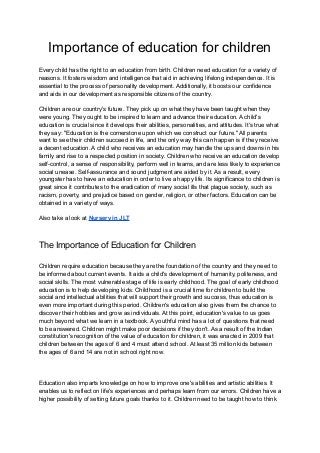
Importance of education for children
- 1. Importance of education for children Every child has the right to an education from birth. Children need education for a variety of reasons. It fosters wisdom and intelligence that aid in achieving lifelong independence. It is essential to the process of personality development. Additionally, it boosts our confidence and aids in our development as responsible citizens of the country. Children are our country's future. They pick up on what they have been taught when they were young. They ought to be inspired to learn and advance their education. A child's education is crucial since it develops their abilities, personalities, and attitudes. It's true what they say: "Education is the cornerstone upon which we construct our future." All parents want to see their children succeed in life, and the only way this can happen is if they receive a decent education. A child who receives an education may handle the ups and downs in his family and rise to a respected position in society. Children who receive an education develop self-control, a sense of responsibility, perform well in teams, and are less likely to experience social unease. Self-assurance and sound judgment are aided by it. As a result, every youngster has to have an education in order to live a happy life. Its significance to children is great since it contributes to the eradication of many social ills that plague society, such as racism, poverty, and prejudice based on gender, religion, or other factors. Education can be obtained in a variety of ways. Also take a look at Nursery in JLT The Importance of Education for Children Children require education because they are the foundation of the country and they need to be informed about current events. It aids a child's development of humanity, politeness, and social skills. The most vulnerable stage of life is early childhood. The goal of early childhood education is to help developing kids. Childhood is a crucial time for children to build the social and intellectual abilities that will support their growth and success, thus education is even more important during this period. Children's education also gives them the chance to discover their hobbies and grow as individuals. At this point, education's value to us goes much beyond what we learn in a textbook. A youthful mind has a lot of questions that need to be answered. Children might make poor decisions if they don't. As a result of the Indian constitution's recognition of the value of education for children, it was enacted in 2009 that children between the ages of 6 and 4 must attend school. At least 35 million kids between the ages of 6 and 14 are not in school right now. Education also imparts knowledge on how to improve one's abilities and artistic abilities. It enables us to reflect on life's experiences and perhaps learn from our errors. Children have a higher possibility of setting future goals thanks to it. Children need to be taught how to think
- 2. logically in order to act and succeed. To learn how to survive in this world, children must receive an education. Also Read: Nursery in Business Bay School Education's Role in a Child's Growth Children learn the fundamentals they will need to know in order to create their futures in schools. Children need it not just for academic purposes but also to enhance their learning capacity. It offers a foundation for the improvement of primary education-specific abilities. Everybody has a right to a good education. A better career is a result of more education. Stability in life is provided by school. A child's education is crucial since it helps them build their self-esteem. The lessons we learned in school have a significant influence on how we live today. School offers a wide range of information in numerous fields. Teaching history enhances comprehension of culture, while teaching arithmetic aids in improving financial understanding. Additionally, education in schools encourages communication and social skills. Going to school helps students learn and communicate well with their peers and teachers. It offers the chance to learn about a variety of topics, including politics, arithmetic, history, literature, and much more. The growth of cognitive processes is aided by this. Additionally, schools are where children first begin to socialize. Children are exposed to new concepts as well as peers their own age in schools. It turns out that developing empathy, companionship, teamwork, and helping others is crucial for a child's development. Additionally, education is crucial for physical growth. A youngster goes through a number of bodily changes. While a child's energy is controlled at home, it can be directed toward more socially acceptable activities at school. According to studies, children learn to behave best when among other kids their own age and are better able to handle sudden spurts of energy in a familiar setting. Additionally, familiarity encourages exploiting circumstances, whereas in school the playing field is level. Additionally, the availability of activities like sports, crafts, etc. encourages kids to channel their unlimited energy into something positive. Only via education can kids be able to create helpful activities. This planet can only be ignited by it. Therefore, a child's total growth is based on the education they receive. Conclusion
- 3. The only means through which the society can undergo the desired change and improvement is through education. Gaining knowledge and information is the process that paves the way for a successful existence. Studies have indicated that civilizations with higher levels of education had less instances of crime and violence. By promoting the holistic development of future people, it is crucial for shaping the destiny of a country.